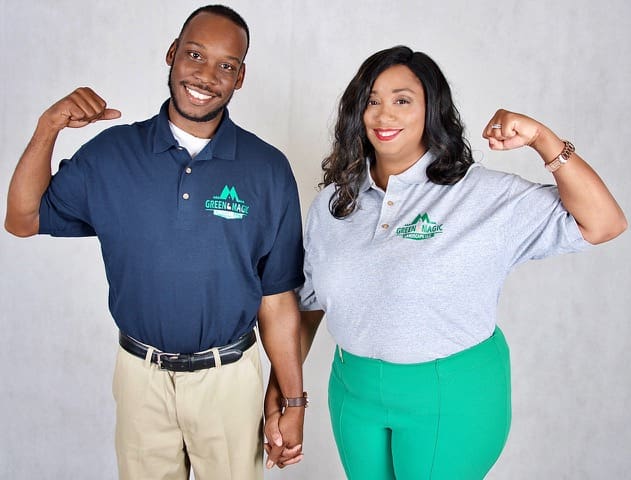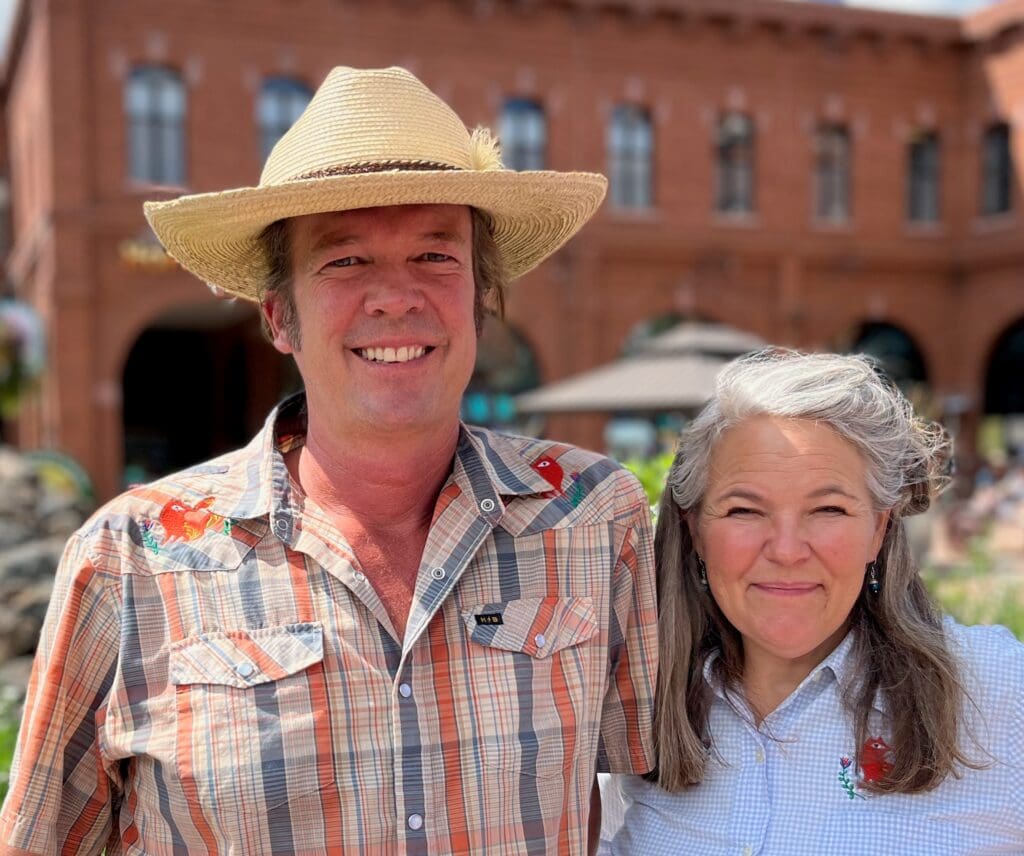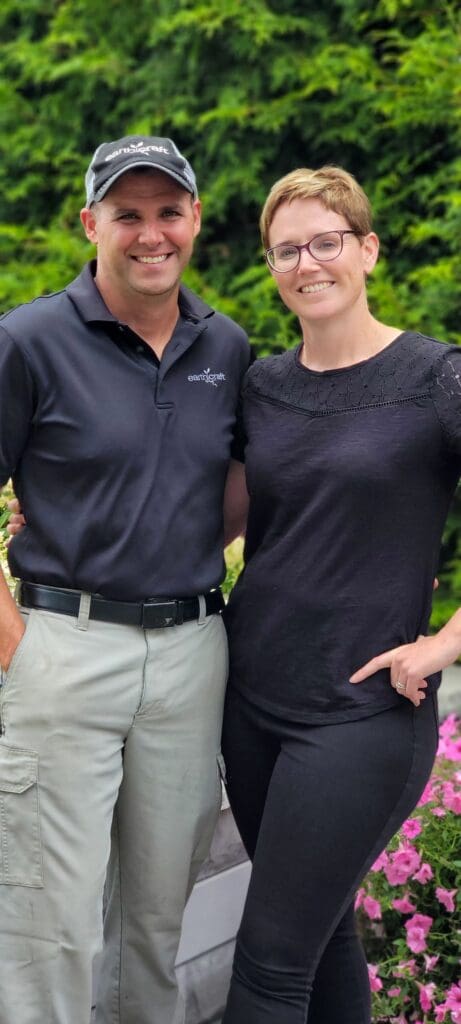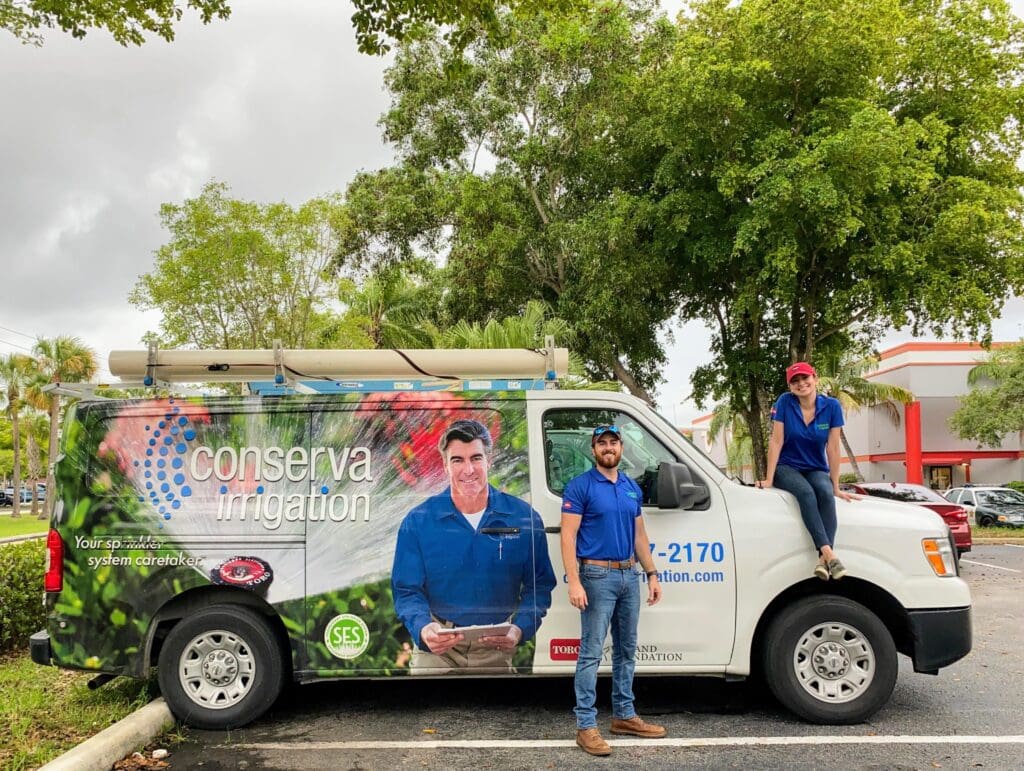
Running a business can be hard, but who better to partner with than your spouse? These work dynamics, when done right, can be a beautiful balance of one another’s talents. However, there are pitfalls.
You can avoid some of these troubles with these three practices.
Define Your Roles
One of the first steps to working well with your partner is to determine each other’s strengths and weaknesses and assign job responsibilities that match these.
Jason Minshew and Annie Taylor, owners of Foxglove Gardening, based in Flagstaff, Arizona, met and worked at a landscape architecture firm in 2001 and have been married for 18 years. They started their own company in Austin, Texas, before relocating to Arizona and buying Foxglove eight years ago.

Taylor says they have very distinct roles, so there’s not a lot of risk of stepping on each other’s toes or having misunderstandings about who is supposed to do what.
“Jason’s out in the field and is the gardener and the landscaper and running the crews and I’m just in the background doing the office work and HR and stuff like that,” Taylor says. “Between the two of us, we get it all done; if one or the other wasn’t here, I think it’d all fall apart.”
Carita and Larry Koen, owners of Green Magic Landscape LLC, based in Mobile, Alabama, started working together in April 2016 and got married in September 2016. She says since they have different personalities, the tasks that they usually don’t prefer are the very tasks that the other spouse does well. She says they also realize that Rome was not built in a day, so they are realistic about those responsibilities when they divide up tasks.
“My husband tends to focus on detail-oriented tasks in the field while I concentrate on customer relations and community involvement,” Koen says. “Together, we complement each other’s strengths, creating a harmonious dynamic that fosters creativity and productivity in our work.”
Shanna and Aaron Scordo, owners of EarthCraft Landscaping, based in Indiana, Pennsylvania, who have been in business together for 14 years and married for 17 years, divide their work in a similar way.

“Since our skill sets are opposite, it’s been pretty easy to divide things up,” Scordo says. “I like all the people-facing stuff, like leadership, organizational health, and sales, and I gravitate toward big-picture thinking and strategy. Aaron likes being behind the scenes. He handles all the finances, manages the fleet and facility, and provides support and expertise to the crews. He’s a great problem-solver and a super smart guy, especially with anything hands-on or mechanical.”
Ellie Lamonaca and her husband Juan, owners of Conserva Irrigation of Fort Lauderdale, Florida, became franchisees together six years ago and have been married for six years as well.
“We give ourselves designated roles with our own responsibilities and decisions to make — decisions that don’t require us checking in with the other,” Lamonaca says. “This is crucial as there aren’t enough hours in the day for both of us to do everything. We trust each other to make our own respective decisions and come together for the important ones.”
Ira Wade, co-owner of Wade’s Lawn Service, based in Goodlettsville, Tennessee, started the company in 1998 and his wife Deborah joined him full-time in 2004. They’ve been married for 39 years.
Deborah handles administrative and logistical tasks while Ira is out in the field and is responsible for quality control. The Wades meet most of their clients together.
Jillian Burns, vice president and co-owner of Burns Landscape & Snow Management, based in Wilmington, Massachusetts, has been married for 10 years and joined her husband Kevin in the business eight years ago after they had discovered their bookkeeper was embezzling money from their company.
“This revelation was a significant blow to us, especially as I was pregnant with our daughter at the time, adding a deeply personal layer to the professional crisis we were navigating,” Burns says. “Despite the difficult circumstances, joining Kev in the business turned out to be a pivotal moment for both of us and for the company. It was a time of immense challenge, yet it also marked the beginning of a new chapter where we could combine our strengths and visions to rebuild and steer the company toward a more secure and prosperous future.”
Burns says that Kevin takes the lead on operations, overseeing the day-to-day activities, managing their teams, and ensuring that their services are delivered to the highest standard. Meanwhile, Burns ensures their systems and processes are followed and manages all the administrative and financial tasks.
“This division of labor allows us to cover all bases of the business, ensuring that both the front-end and back-end are functioning seamlessly,” Burns says. “It’s a collaborative effort that requires constant communication and mutual support, enabling us to tackle challenges, capitalize on opportunities, and drive our business forward. By focusing on our areas of expertise and working together towards our common goals, we ensure that our business not only runs smoothly but also grows and thrives.”
Once you’ve defined one another’s roles in the business, it’s important to respect one another’s boundaries.
“We have to set those healthy boundaries,” Deborah Wade says. “We have those boundaries, then we get along fine. But if we go over those boundaries, then there can be fireworks.”
Find Balance
Boundaries are also important when separating your work and personal life. One major challenge working couples encounter is finding a balance between work hours and personal time.
“We try to stop talking shop after work hours, but that’s probably one of the things we have the toughest time with,” Lamonaca says. “It’s such a big part of our lives, so it’s natural that our conversations organically gravitate towards that. The key is making sure you’re also talking about and connecting on other things in your lives as well.”

Koen agrees they try their best to keep shop talk at work but admits the best business ideas often happen after hours.
Deborah says there are times there may be family drama that they discuss at work, but they never do it in front of their staff. She says they try not to let it affect them. Minshew says during slower parts of the season, they try to make a point of spending more time with their family to balance out the times they are more focused on the business.
Burns says they have learned to compartmentalize their roles to protect their family time and create a sanctuary from work-related stress.
“We made a conscious decision to limit work discussions outside of business hours, adhering to a simple but powerful rule: unless the topic directly affects the health of our business, we leave it at the door,” Burns says.
Having children can be an additional stressor in the balancing act between work and marriage. Burns says it was a daunting task at first and they had to become even more organized and efficient with managing their time. She says they also had to learn to be flexible.
Burns says juggling a business while raising three young, active children has caused them to have an on-the-run lifestyle where they often have to divide and conquer their business responsibilities and family obligations simultaneously.

“We’ve learned to support each other in every aspect of life, ensuring that one can step in when the other is stretched thin, whether it’s attending a child’s soccer game or leading an important client meeting,” Burns says. “This ability to lean on each other, both at work and home, has been instrumental in navigating the complexities of our dual roles.”
Scordo says before they had children, they lived the business 24/7. Now, they make an effort to turn off when they’re at home and make time for regular family vacations and to have time together away from the kids, too.
“It takes effort, but we do a pretty good job of keeping work at work,” Scordo says. “We’re also both huge proponents of therapy. Owning a business is stressful, and certainly, you shouldn’t keep everything inside because that’s a very heavy load to carry. But if you work with your spouse and you bring those problems home, it doesn’t give either of you a chance to have downtime from work. Therapy is a fantastic, healthy outlet to help us work through our stressors. We’re better partners, better leaders, and better parents because of it.”
Agree on Decisions
Being able to come to a consensus on decisions is critical to running your company smoothly. Just like with any other business partner, you need to know if one person gets the final say or if both parties have to be in agreement before moving forward.
The Wades and Minshew and Taylor both say they will discuss any kind of major purchase or decision.

“We look at it overall, we look at what we need to do and we pray about it,” Deborah says. “We pray about everything so we can know that we’re going in the right direction. We let peace rule us, so once we pray about something, and we get a peace about it, and it makes sense, or sometimes it may not even make sense, but if we have a peace about to go in this direction, that’s what we try to do.”
Taylor says typically, they are on the same page with their business decisions. She says there can be tension when one of them is burned out or has too much on their plate, but this is a case of timing certain discussions for later when they have more bandwidth.
“There’s not one of us that just sort of unilaterally goes off and does their own thing,” Minshew says. “We check in on everything. Outside of work when we’re not here, Annie and our two boys, we’re all each other’s best friends.”
Koen says they keep an open line of communication to discuss decisions, so they don’t become a personal issue later.
Burns says that she and her husband have learned the importance of making decisions that are good for the business in the short-term and the long-term impact on their family, their employees’ families and the overall health of the company.
“Our consensus-building process is deeply rooted in our shared values and the overarching question: How will this decision affect the health, well-being, and future of our children and the families that are part of Burns?” Burns says. “This perspective ensures that our decisions are not solely driven by financial gain or immediate outcomes but are balanced with the well-being and future sustainability of our community.”
Burns says they will weigh the pros and cons and sometimes agree to disagree before coming to a final decision. She says the key is to align their decisions with their core values.
Lamonaca says in the event they can’t come to an agreement, they’re good about compromising or brainstorming a new option.
“In the rare case that we both feel strongly about something and believe it’s a battle worth fighting, we simply flip a coin,” Lamonaca says. “In six years, we’ve only had to do that less than a handful of times and we’ve never regretted the outcome that came from it.”
Scordo says, in their case, she is the final decision-maker because her husband trusts her to see the big picture. In other areas where he has more expertise, Scordo will defer to him.
“If either of us are truly against something happening, there’s usually a good reason, and so we talk through it until we come to an agreement,” Scordo says. “But no matter where we land, we support each other 100%.”


